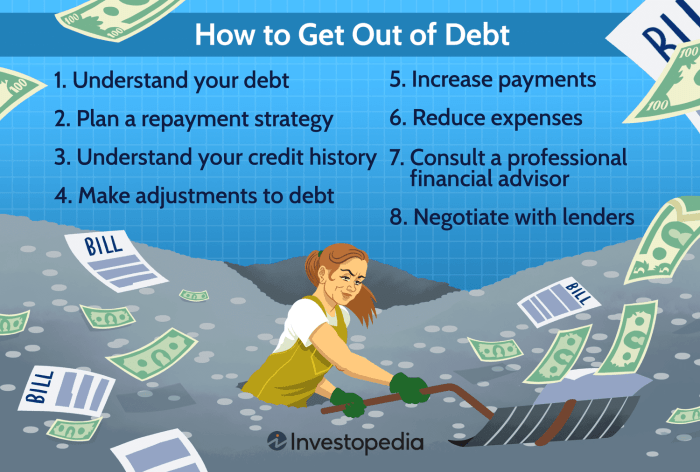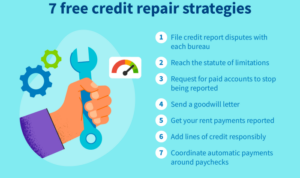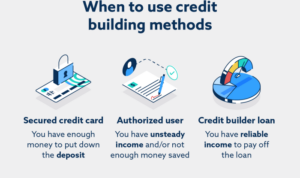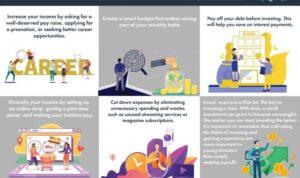Yo, we’re diving into the world of getting out of debt. Buckle up because we’re about to drop some knowledge on how to navigate those financial waters and come out on top.
Now, let’s break it down step by step starting with understanding what debt is and how it can sneak up on you.
Understanding Debt

Debt is money that is borrowed and must be repaid, usually with interest. It accumulates when individuals spend more than they earn and rely on credit to cover expenses. This can lead to a cycle of borrowing and struggling to make payments, resulting in a growing debt burden.
Types of Debt
- Credit Card Debt: This type of debt involves using credit cards to make purchases and carrying a balance from month to month, resulting in high interest charges.
- Student Loans: Loans taken out to fund education expenses can accumulate over time and become a significant financial burden.
- Mortgage Debt: Homebuyers often take out loans to purchase a home, with the property serving as collateral for the debt.
- Personal Loans: These loans are taken out for various purposes, such as medical expenses, home improvements, or debt consolidation.
Consequences of Debt
- High Interest Payments: Accumulating debt usually comes with high interest rates, leading to increased total repayment amounts over time.
- Damage to Credit Score: Failing to make timely payments or defaulting on debt can negatively impact an individual’s credit score, making it harder to access credit in the future.
- Stress and Anxiety: Living with debt can cause emotional stress and anxiety, affecting mental health and overall well-being.
- Limited Financial Freedom: Being in debt can restrict financial flexibility and limit opportunities for savings, investments, or major purchases.
Creating a Budget
Creating a budget is a crucial step in managing debt effectively. It helps you track your expenses, prioritize payments, and avoid overspending. Here are some tips on how to create a realistic budget:
Track Your Income and Expenses
To start, list all your sources of income and fixed expenses, such as rent, utilities, and loan payments. Then, track your variable expenses like groceries, entertainment, and transportation. This will give you a clear picture of your financial situation.
Set Financial Goals
Define short-term and long-term financial goals, such as paying off a credit card debt or saving for a vacation. Having clear objectives will motivate you to stick to your budget.
Use Budgeting Tools or Apps
There are various budgeting tools and apps available to help you track your spending and stay within your budget. Examples include Mint, YNAB (You Need a Budget), and PocketGuard. These tools can categorize your expenses, set spending limits, and provide insights into your financial habits.
Stick to Your Budget
One of the most important aspects of budgeting is sticking to it. Avoid unnecessary purchases, track your spending regularly, and adjust your budget as needed. By staying disciplined, you can effectively manage your debt and work towards financial stability.
Managing Expenses
Managing expenses is crucial when trying to get out of debt. By cutting down on unnecessary spending and prioritizing expenses, you can free up more money to put towards paying off your debts.
Cutting Down Unnecessary Expenses
- Avoid eating out at restaurants frequently and opt for cooking at home instead. This can save you a significant amount of money each month.
- Cancel any unused subscriptions or memberships that you are paying for. Consider if you really need them or if they are just adding to your expenses.
- Limit impulse purchases and stick to shopping lists when buying groceries or other items. This can help prevent unnecessary spending.
Prioritizing Expenses
- Make a list of your essential expenses such as rent, utilities, and groceries. These should be paid first to ensure you have the basics covered.
- Prioritize debt payments by focusing on high-interest debts first. By paying these off sooner, you can save money on interest in the long run.
- Avoid taking on new debt while you are trying to pay off existing debts. This can help prevent your debt from growing further.
Needs vs Wants
- Understand the difference between needs and wants. Needs are essential for survival, such as food and shelter, while wants are things you desire but can live without.
- When managing debt, prioritize your needs over your wants. Focus on covering basic necessities before spending on non-essential items.
- Consider if a purchase is a need or a want before making it. This can help you make more informed decisions about where your money goes.
Increasing Income
When it comes to getting out of debt faster, increasing your income can be a game-changer. By bringing in more money, you’ll have more resources to put towards paying off your debts. Here are some suggestions on how to boost your income and make extra money:
Side Hustles
- Consider starting a side hustle, such as freelance work, tutoring, pet sitting, or selling handmade crafts online. This can bring in additional income that you can put directly towards your debts.
- Look for opportunities to monetize your hobbies or skills. Whether it’s photography, graphic design, writing, or baking, there may be people willing to pay for your talents.
Rent Out Your Space
- If you have a spare room in your home, consider renting it out on platforms like Airbnb or VRBO. This can be a great way to earn extra cash without a significant time commitment.
- You can also rent out your parking space, storage space, or even your car when you’re not using it to bring in some additional income.
Part-Time Jobs
- Look for part-time job opportunities in your area, such as retail, food service, or customer service roles. Even working a few extra hours a week can make a difference in paying off your debts.
- Consider seasonal work during busy times of the year, like the holidays or summer, to earn extra income that you can dedicate towards your debt repayment.
Negotiating with Creditors
When it comes to getting out of debt, negotiating with creditors can be a crucial step in helping you lower interest rates or settle your debt. By effectively communicating with your creditors and working out payment plans, you can potentially ease the burden of your debt and make it more manageable.
Tips for Effective Communication
- Be honest and transparent about your financial situation. Share any hardships or challenges you are facing that are impacting your ability to pay off your debt.
- Stay calm and respectful during your conversations with creditors. Getting angry or defensive can hinder the negotiation process.
- Ask questions and seek clarification on any terms or conditions presented by your creditors. Make sure you fully understand the options available to you.
- Keep detailed records of all communication with creditors, including dates, times, and agreements made. This can help you track progress and hold both parties accountable.
Benefits of Negotiating Payment Plans
- Lower interest rates: By negotiating with creditors, you may be able to secure lower interest rates on your outstanding debt, reducing the overall amount you owe.
- Debt settlement: Through negotiation, you may be able to settle your debt for less than the total amount owed, providing you with a faster path to debt freedom.
- Improved credit score: Successfully negotiating payment plans and sticking to them can demonstrate your commitment to repaying your debt, which can positively impact your credit score over time.
Seeking Professional Help
Seeking professional help from credit counseling agencies, debt consolidation companies, debt settlement companies, or financial advisors can be a wise decision when dealing with overwhelming debt. These professionals can provide guidance and assistance in creating a plan to manage and reduce your debt effectively.
Credit Counseling Agencies
Credit counseling agencies offer services to help you understand your financial situation, create a budget, and develop a repayment plan. They can negotiate with creditors on your behalf to lower interest rates or waive fees, making it easier for you to pay off your debt.
Debt Consolidation or Debt Settlement Companies
Debt consolidation companies combine multiple debts into one monthly payment, usually with a lower interest rate. Debt settlement companies negotiate with creditors to settle debts for less than what is owed. While these options can be helpful, it’s essential to research and choose reputable companies to avoid scams or further financial damage.
Financial Advisor Consultation
Consulting with a financial advisor can provide personalized advice on managing debt, budgeting, investing, and planning for the future. Financial advisors can offer strategies to improve your financial situation, increase savings, and achieve long-term financial goals. If you’re unsure about the best approach to tackle your debt, seeking advice from a financial advisor can offer valuable insights and recommendations.
Building an Emergency Fund
Building an emergency fund is crucial when you’re working on paying off debt. It acts as a safety net, protecting you from falling back into debt when unexpected expenses come up. Here are some strategies to help you build and maintain your emergency fund.
Importance of Having an Emergency Fund
- Having an emergency fund ensures that you have money set aside for unexpected expenses like medical bills, car repairs, or home emergencies.
- It prevents you from having to rely on credit cards or loans to cover these expenses, which can lead to further debt.
- An emergency fund provides peace of mind and financial security, knowing that you have a buffer in case of emergencies.
Strategies for Saving Money
- Set a specific savings goal each month and automate transfers to your emergency fund to ensure consistency.
- Cut back on non-essential expenses like dining out, entertainment, or shopping to free up more money for savings.
- Consider picking up a side hustle or selling items you no longer need to boost your savings rate.
Handling Unexpected Expenses
- When faced with an unexpected expense, evaluate the urgency and importance before dipping into your emergency fund.
- Use your emergency fund only for true emergencies and avoid tapping into it for non-essential purchases.
- Replenish your emergency fund as soon as possible after using it, to ensure you’re always prepared for the next unexpected expense.
Changing Spending Habits
Changing spending habits is crucial when trying to get out of debt. By identifying unhealthy spending patterns and replacing them with healthier habits, individuals can make significant progress towards financial stability.
Unhealthy Spending Habits
- Overspending on unnecessary items such as designer clothes, gadgets, or dining out frequently
- Relying on credit cards for everyday expenses without a plan to pay off the balance
- Ignoring budget constraints and making impulse purchases without considering long-term consequences
Developing Healthy Spending Habits
- Create a realistic budget that includes savings goals and limits on discretionary spending
- Avoid emotional spending by taking time to consider purchases and differentiate between wants and needs
- Track expenses regularly to stay accountable and adjust spending habits as needed
Psychological Aspect of Changing Spending Behaviors
Changing spending behaviors involves addressing underlying psychological factors that contribute to unhealthy habits. This may include identifying triggers for impulsive spending, setting financial goals, and practicing mindfulness when making purchasing decisions. By understanding the emotional drivers behind spending habits, individuals can develop a healthier relationship with money and work towards a debt-free future.






